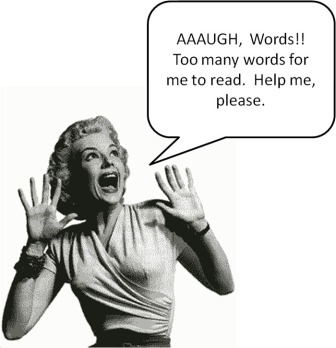
[source]
Here’s a quick, simple example of the kind of narration I’m talking about:
–When the conversation ended, he disconnected the call, turned off his phone, placed it in the passenger’s seat, buckled his seatbelt, backed the car down the driveway, pulled into the road, and headed for his next stop.–
This is obviously too much narration, and anyone should be able to spot this. But it’s a great example of the kind of unnecessary wording I often see and suggest cutting.
Most of the narration in the example is inferred by the reader and therefore not necessary to actually write out. After the conversation ended, we are going to assume he disconnected the call and turned off his phone. We also don’t need to know he placed the phone in the passenger seat unless this specific detail comes back later in the book. We also probably don’t care whether or not he buckled his seatbelt unless, once again, this detail is important later in the story. Readers will then go on to assume he backed the car down the driveway and pulled into the road.
Sometimes I find it helpful to think of reading a book like watching a movie.
When you’re watching a movie, you don’t actually need to see the character walk up to the door, insert the key in the lock, open the door, walk through it, and sit on the couch. Unless that is a vital part in the story where a character received his or her first kiss or gets abducted, if you see a character walk up the walkway, and in the next scene he or she is in the living room on the couch, you assume what happened in between.
Likewise, when you’re writing a book, you need to be careful of giving readers too much information lest they quickly become bored. You would probably get bored of a movie that showed every little movement of a character, and readers will get bored of a book that goes into too much detail.
Another negative outcome of too much unnecessary narration is that you’re not allowing readers to insert any imagination into the scenes you’ve created. In the example scene, is it important to know that the character ended the phone call, turned off his phone, placed it in the passenger’s seat, buckled his seatbelt, backed the car down the driveway, pulled into the road, and headed for his next stop? Probably not.
Decide what readers will be able to infer, and cut the rest.
Do you agree that there is such a thing as too much narration? Do you have any good tips for recognizing when you need to trim a scene?

I usually go by the rule of thumb that obvious things or everyday actions don’t get mentioned unless there’s something special about them. For example, there’s no point mentioning the colour of the sky unless it isn’t blue and the different colour has some relevance to the story.
Also, I love my long paragraphs so I usually try to cut at least 10% of excessive paragraphs (about 70%) during the first draft. Having an amount to cut in mind does wonders for helping me sort out what is and isn’t essential.
That’s a great tip! Thanks for sharing!
I always think, lose the stage directions, you’re writing a book, not a play…
Very true. Great point!
They will all provide lighting to your indoor
garden, but each comes with different positive and negative characteristics that you’ll have to weigh appropriately.
The UFO LED light is suited to this purpose, because it not only offers the bright light needed for germination, but in the
case of lettuce, which requires cooler soil and air temperatures for germination to occur, the LED UFO grow light
produces no heat. They produce the two main wavelengths that plants
need for their growth, which are the blue light
and the red light.
Weigh up prices to discover the best loan provider. If you
are unsure whether you owe a payment, call the 1-800 number on the back of
the card itself. Credit cards are one alternative when making purchases to buy things without
needing cash.
Pingback: see this site
Pingback: synchronized wireless clocks for sale
I really enjoyed the navigational experience. As I have already been searching across
the internet, I can see that I need to utilize something other than Tumblr.
Thanks a lot for the eye opening experience